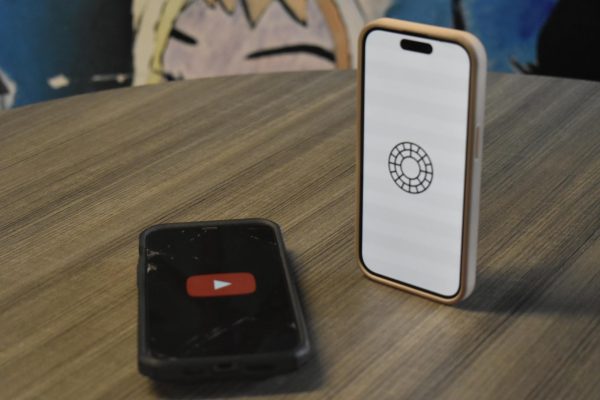Taylor Swift silenced from “Speaking Now” about her experience with body dysmorphia
Although society is reaching an all-time high for mental health awareness, celebrities are still facing heavy scrutiny about what they depict in their art, particularly surrounding mental health. Musical artist Taylor Swift received backlash for her display of body dysmorphia in her “Anti-Hero” music video. “There’s a difference between saying being fat is bad and saying you have [an] eating disorder that you’re constantly battling,” Swift fan @expiredthrills said on Twitter.
The camera pans across a bathroom wall as musical artist Taylor Swift looks down as she stands on the scale. Zooming in, we discover that the scale reads “FAT.” Fans and critics collectively booed online at this scene in her “Anti-Hero” music video. Throughout dozens of angry Twitter threads and YouTube comments, three phrases stood out against the rest: “Fatphobic.” “Self-Sabotage.” “Body shaming.”
The main criticism she received claimed that she was being insensitive to issues of fatphobia, an implicit or explicit bias towards people who are overweight. Critics believed this scene was fatphobic because of its connection to the cultural belief that being fat is undesirable.
This backlash resulted in Swift changing the video to portray a clone of herself instead glancing down at the scale in disapproval. However, her intention with the original clip was not to be fatphobic or offend people who struggle with eating disorders but to better assert her struggles with the body dysmorphia she hints at in her lyrics.
Swift wanted to display her experience with body image to encourage others to speak up about eating disorders and body dysmorphia. Instead, she was met with heavy criticism that resulted in her message being silenced, and the original video’s important lesson was diminished. The pessimistic reactions to Swift’s song show the constant limit on celebrities’ ability to advocate for their beliefs and struggles and the unnecessary censorship of conversations about body image. Rather than tearing down celebrities who share their vulnerable messages of advocacy, we should uplift them for being confident in their goal of helping others.
The message she was trying to portray
Swift first announced “Anti-Hero” Oct. 2, hinting at the true meaning of Swift’s insecurities through an Instagram post. Later, she claimed in a Billboard article that the song was one of her favorite songs she’d ever written.
The song puts all of her insecurities under a spotlight, covering topics such as worries about her appearance and personality, struggles with depression and the urge to be antisocial, strongly relating to her ongoing discontent with her mental health. She also references being fed up with dealing with her self-worth issues. Swift utilizes her song to pinpoint the severe detriment of eating disorders on mental and physical health. Together, Swift’s lyrics weave a narrative about her battle with identity and the backlash she gets from society when trying to express her experience with eating disorders and body dysmorphia.
Swift first spoke about her battle with eating disorders and body dysmorphia in her 2020 Netflix documentary “Miss Americana.” In this documentary, she expresses how toxic it is to see photos of herself in the media because it affects her “looking-glass self,” or how other people in society perceive her and, in return, how she perceives herself.
Later in the documentary, Swift discussed how she viewed her career and lifestyle on a punishment or reward scale, including when she could eat, how often she exercised, and which outfits she could wear. Swift initially realized this was how she viewed her life early in her career. The first time she appeared on the magazine cover, the headline read ‘Pregnant at 18,’ and included an arrow pointing toward her midsection. Swift stated that she registered this negative comment as something she should be punished for, which fueled insecurities about her body.
In Swift’s conversations about mental illness, she brings awareness to eating disorders and how they should be destigmatized in society. Nine percent of the U.S. population suffers from eating disorders, roughly 28.8 million people. These disorders are among the deadliest mental illnesses, with over 10,200 deaths annually. Celebrities and other influencers helping to destigmatize stereotypes about mental illnesses can create a more welcoming environment for people to express their feelings, which may lead to more people with these disorders reaching out for help and getting the treatment they need.
The message people interpreted
“It’s okay not to be okay,” is a popular phrase used on the internet to decrease the stigma surrounding mental illness. The world has become a safer place to express personal struggles — or at least, that’s what we have come to believe. But are we truly in a safe environment to express our experiences if celebrities are judged for sharing theirs?
“Body shaming” is a battle between mental health advocates and well-meaning yet misinformed online patrons. The line between each side is getting lost behind the online hatred, and it seems that people are starting arguments just to argue. Internet users try to expose videos, social media posts or comments to determine whether celebrities are body shaming or fatphobic.
In online environments, people often think it is their job to correct others’ mistakes, which means there will always be someone who believes certain actions are insensitive. Even if an online post intends to bring awareness to body dysmorphia or help inform people about a misunderstood concept, it can be taken wrongly by others because of the internet’s correctional environment.
TikTok influencer Reyna Cohan criticized Swift for the choices made in the “Anti-Hero” video, calling Swift’s actions body shaming. Cohan created a video in reaction to the music video, stating, “Being fat is not a bad thing, and in five seconds of your music video, you have successfully reinforced the idea that it is.” This video has now been removed from TikTok.
Although some Swift fans and haters reacted negatively to her music video, others acknowledged how important Swift’s story is to spreading awareness of eating disorders and claimed that the video intended to criticize her life experiences.
Swift supporter and YouTuber Ryan Beard — professionally known as Mr. Beard — commented on Twitter over 20 times, joining the discussion of this music video and fatphobia.
“The message Taylor is very clearly promoting is that society teaches girls and women to fear being fat and that this has been harmful to her mental health, and it’s also harmful to the fat people who are stigmatized in the process,” Beard said on Twitter.
Even though Swift was pressured into changing the video and removing the scale scene, her message must be received: her eating disorder affected how she viewed herself, degrading her mental and physical health.
The message we should be applauding
To understand the detriment these mental disorders have on people around the world, we have to take time to understand the side effects and their symptoms.
Eating disorders are mental illnesses that show in multiple different forms. Anorexia nervosa, bulimia nervosa and rumination syndrome are among the most well-known eating disorders. They can develop in people of all ages and genders, not just the typical stereotype of young females.
Specific causes of eating disorders have not been narrowed down; however, it is believed that cultural factors can influence the development of eating disorders. Other mental illnesses like OCD and post-traumatic stress disorder (PTSD) affect this development. Despite research on these factors, the media still does not accurately portray eating disorders. In general, only young women are pictured as being affected by eating disorders, when statistics show the diversity is almost half, with 2.2% of males diagnosed with Body Dysmorphic Disorder (BDD) contrasted to 2.5% of females diagnosed. Additionally, people who try to reach out to society about the effects of their eating disorders are shown as victims or villains when talking about body image. In this instance, Swift is unnecessarily villainized.
Something commonly diagnosed alongside eating disorders is BDD. There are multiple ways that BDD can develop, but it is most commonly seen in the early teenage years in both males and females. Specific factors like family heritage, perfectionism, societal expectations and other mental illnesses can increase the risk of developing BDD.
People diagnosed with BDD may look at parts of themselves — their nose, hair, stomach, chest or skin — and find fault in them so extreme that it causes emotional distress and inability to function. Women may obsess over breast size while men may focus on muscles; either way, it becomes a consuming and perfectionist disorder where many are never satisfied with their physical appearance.
Tendencies associated with BDD include — but aren’t limited to — low self-esteem, social isolation, depression or mood disorders, substance abuse, anxiety disorders, eating disorders, obsessive-compulsive disorder (OCD) and suicidal behavior.
BDD may seem insignificant, shallow or self-centered to the outside world; However, this view of perfectionism through the lens of someone with an eating disorder is linked to anxiety and the compulsion to purge or fix all of the “imperfections” they can find. Even if those imperfections are fixed, they will always find more. This disorder mustn’t be viewed as insignificant in society because the prejudice surrounding BDD heavily affects how people with it view themselves and interact in society.
Though not every person with an eating disorder or body dysmorphia experiences the same thing, this perfectionist view of one’s body is very common for millions of people. We should not be vilifying people who share their mental health journeys with the world through any form of media because it negatively affects the person being villainized and also guilts others with similar experiences. Mental illnesses, eating disorders, and other stigmatized topics cannot become normalized if the people sharing them continue to be denigrated. We must work to understand the message Swift is conveying to people who are struggling with eating disorders. Swift’s message in her music video wasn’t to body shame or be fatphobic, but to convey a message of vulnerability that we should encourage instead of debating and degrading.
Body shaming is humiliating or mocking someone based on body shape or size. Swift is not body shaming in her video because when the scale reading “fat” does not refer to anything but how she sees herself. Although she views herself critically, it is not outwardly directed towards anyone but herself. The belief that being “fat” is not ideal is part of the illness she deals with; it’s not a comment about anyone else’s body but rather a comment on perfectionism that pairs with what Swift’s illness tells her she has to look like.
These self-critical comments repeatedly form, telling people who struggle with body image that they are not perfect. Someone with an eating disorder like Swift can be a size double-zero and still see “imperfections” in their body and feel the compulsive need to change or fix them. This is a common side effect of eating disorders and body dysmorphia. It only affects how people see themselves; it has nothing to do with how they view other people, meaning Swift is showcasing her encounters with mental illness.
According to Mayo Clinic, preventative treatments have not yet been discovered; however, identifying the disorder early and starting treatment can benefit a patient’s overall health since this disorder typically develops at a young age. Awareness of these symptoms can also change the current hostile environment surrounding eating disorders and body dysmorphia into a place where people can share their stories to encourage others through their struggles. By uplifting celebrities who raise awareness, neurodivergent people realize they aren’t alone in their struggles, and neurotypical people understand these struggles and better support their peers.
Regardless of people’s opinions about this video, Swift intended to share her personal experience and encourage more open, inclusive discussions on eating disorders and body dysmorphia. Society recently faced a wave of realization and normalization in discussing mental health; by shaming those sharing their stories, we are taking a step in the wrong direction in this advocacy process. When people like Swift share their struggles with mental illness, eating disorders or body dysmorphia, it creates a safer space for others to express the struggles and reality of eating disorders. As a whole, we must do a better job of supporting people who are vulnerable enough to share these struggles. This ripple effect of awareness will lead to a better understanding of how eating disorders affect people and greater empathy for people who experience these disorders.
BDD typically doesn’t get better by itself. If left untreated, it may worsen over time and lead to anxiety, severe depression, poor health and even suicidal thoughts or behavior. If you are struggling with an eating disorder, contact your doctor or therapist to discuss treatment options that fit your needs. If you are facing suicidal tendencies, you can call the National Suicide Prevention Lifeline at 988 or use its webchat at suicidepreventionlifeline.org/chat.



![There are more than 20 open cardio machines at Crunch Fitness. I enjoyed the spacious environment at Crunch, a sentiment that was shared by sophomore Sanjana Daggubati. “[Going to] Crunch Fitness was the right decision because [it] feels more professional. Crunch’s workers are laid back, but not to the point where they don't care,” Daggubati said.](https://pwestpathfinder.com/wp-content/uploads/2025/09/IMG_5242-1-600x450.jpg)

![Various empty Kit Kat wrappers crowd the desk, surrounded by scoring sheets. While production of Kit Kat flavors in the U.S. is limited, Nestlé, the owner of Kit Kat, manufactures hundreds of unique flavors in Japan, including the flavors ocean salt and passion fruit. “I thought there [were] some interesting flavors, and a lot of them were really unexpected,” senior Elle Levesque said.](https://pwestpathfinder.com/wp-content/uploads/2025/09/image-2-600x400.png)


![Pantone’s selection of the 2025 Color of the Year is revealed: Mocha Mousse. Ceramics teacher Ashley Drissell enjoys this year’s selection. “Maybe it’s the name but [Mocha Mousse] reminds me of chocolate and coffee. It makes me hungry. It’s very rich and decadent,” Drissell said.](https://pwestpathfinder.com/wp-content/uploads/2025/02/DSC_0015-600x400.jpg)


![Although society is reaching an all-time high for mental health awareness, celebrities are still facing heavy scrutiny about what they depict in their art, particularly surrounding mental health. Musical artist Taylor Swift received backlash for her display of body dysmorphia in her “Anti-Hero” music video. “There’s a difference between saying being fat is bad and saying you have [an] eating disorder that you’re constantly battling,” Swift fan @expiredthrills said on Twitter.](https://pwestpathfinder.com/wp-content/uploads/2022/12/Taylor-Swift-Body-Dysmorphia-.jpg)